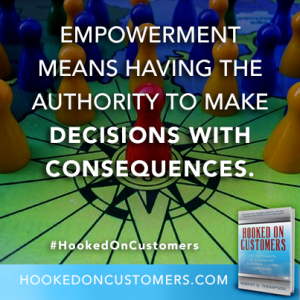Three Ways to Empower Service Reps: Authority, Insights and Motivation
 Empowerment is one of those fuzzy words that can mean many different things. In my view, you need three elements to put the concept to work in customer service: authority, insights, and motivation (AIM).
Empowerment is one of those fuzzy words that can mean many different things. In my view, you need three elements to put the concept to work in customer service: authority, insights, and motivation (AIM).
Authority to Make Decisions with Consequences
At Southwest Airlines, for instance, leaders believe that employees should use their own good judgment in handling passenger situations. And for the most part, they do. It’s one reason that Southwest has been leading the airline industry in customer loyalty for the past eighteen years.
Of course, sometimes employees won’t make good decisions. Southwest’s management took a lot of heat for poorly handled situations with an overweight Hollywood director and the skimpy attire of a young woman (read more about these situations later in this chapter). Despite blowback on social media, Southwest didn’t create a dress code for passengers or write more rules for employees to follow.
Empowerment means having the authority to make decisions with consequences. At Ritz-Carlton, employees have latitude to spend up to $2,000 per incident to create an outstanding experience, not just to fix a problem.
Insights to Get the Job Done Quickly, on One Call
When I had problems with my DSL, I eventually connected with a service agent. I don’t know exactly what was going on, but I could hear keys clicking in the background interspersed with “we’re working on your problem” verbal updates.
My guess is that my hard-working agent was experiencing some version of “Alt-Tab Hell.” That’s my term for what an Aberdeen Agent Desktop Optimization study found: Agents use an average of five different screens to access the systems needed to serve customers. Aberdeen analysts estimate that 26 percent of agent time is spent navigating systems.
Fortunately, there are solutions that can help agents, including
- Virtual contact centers can provide a more usable interface for agents to manage multiple interaction channels, including social media.
- Knowledge management systems can help the agent find an answer quickly, searching multiple information sources while the customer is on the phone.
- For complex problems, an agent can tap the company’s social network to find the right expertise and ask a question.
Motivation to Delight Customers
To paraphrase Einstein, insanity is expecting employees to do one thing while rewarding them for doing something else. A classic example: Executive proclamations to delight customers, while continuing to measure and reward agents who get customers off the phone as quickly as possible. If you’ve ever been on the receiving end of one of those calls, you know it’s anything but delightful.
If delight is part of your company’s strategy, then your rewards system is absolutely essential to reinforce the right behaviors. At AmEx, for example, agents are motivated to deliver a great customer experience through rewards and recognition tied to RTF—would the customer they served “Recommend To a Friend.” Tammy Weinbaum, senior VP and general manager for the American Express service centers in Arizona and Utah, said they “found that this was really the best metric to hold people accountable for the work that they’re doing.”
So that’s it. Three practical ways to empower service agents. Give them the authority, insights, and motivation needed to delight your customers. Good luck improving your AIM.
About Bob
Bob Thompson is an international authority on customer-centric business  management who has researched and shaped leading industry trends since 1998. He is founder and CEO of CustomerThink Corporation, an independent research and publishing firm, and founder and editor-in-chief of CustomerThink.com, the world’s largest online community dedicated to helping business leaders develop and implement customer-centric business strategies. His book Hooked on Customers (April 2014) reveals the five habits of leading customer-centric firms. For more information visit http://hookedoncustomers.com
management who has researched and shaped leading industry trends since 1998. He is founder and CEO of CustomerThink Corporation, an independent research and publishing firm, and founder and editor-in-chief of CustomerThink.com, the world’s largest online community dedicated to helping business leaders develop and implement customer-centric business strategies. His book Hooked on Customers (April 2014) reveals the five habits of leading customer-centric firms. For more information visit http://hookedoncustomers.com